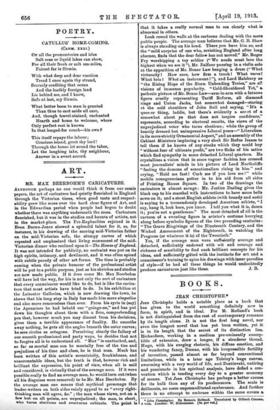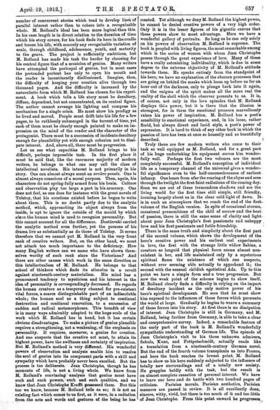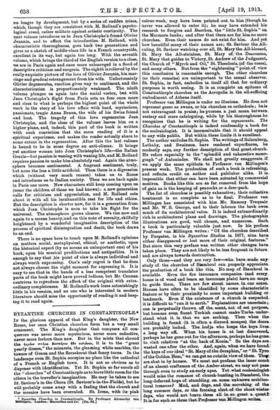BOOKS.
JEAN CHRISTOPHE.*
Jean Christ ophe holds a notable place as a book that has given to the world something definitely new in form, in spirit, and in ideal. For M. Holland's book is not distinguished from the rest of contemporary romance by its length alone. It is not the first long novel, nor even the longest novel that has yet been written, yet it is in its length that the secret of its distinction lies. Richardson, working in a medium pre-eminently suscep- tible of extension, drew a longer, if a slenderer thread. Hugo, with his surging rhetoric, his diffuse emotion, and his wandering fancy, Dumas, with his irrepressible fertility of invention, passed almost as far beyond conventional limitations, while in a later age Tolstoy's huge canvas, swarming with a very world of life, and.Dostiieveki, untiring and passionate in his spiritual analysis, have defied a con- vention which is tending every day to a greater economy of means. Yet Jean Christophe has perhaps a better excuse for its bulk than any of its predecessors. The scale is deliberate, no mere unpremeditated exuberance. And further there is no attempt to embrace within the same covers a • John Christopher. By Romain Rolland. Translated by Gilbert Causes. 4 voln. London : W. Heinemann. De. per voL] number of concurrent stories which tend to develop lines of parallel interest rather than to cohere into a recognizable whole. M. Holland's ideal has been more logical than this. In his case length is in direct relation to the duration of time which his story covers, for his book finds its hero in the cradle and traces his life, with scarcely any recognizable variation of scale, through childhood, adolescence, youth, and maturity to the grave. The project is sufficiently ambitious, but M. Rolland has made his task the harder by choosing for his central figure that of a musician of genius. Many writers have attempted the portrayal of genius, but in most cases the pretended portent has only to open his mouth and the reader is incontinently disillusioned. Imagine, then, the difficulty of keeping your creation alive through two thousand pages. And the difficulty is increased by the naturalistic form which M. Rolland has chosen for his experi- ment. A book which tells a life story must be desultory, diffuse, dependent, but not concentrated, on its central figure. The author cannot arrange his lighting and compose his mechanism for a single crisis. He must show his prodigy as he lived and moved. People must drift into his life for a few pages, to be ruthlessly submerged in the torrent of time, yet each of them must be clearly enough painted to make an im- pression on the mind of the reader and the character of the protagonist. There must be a succession of incidents desultory enough for plausibility yet with enough cohesion not to dissi- pate interest. And, above all, there must be progression.
Let us see what capacities M. Rolland brings to his
difficult, perhaps impossible task. In the first place it must be said that, like the enormous majority of modern writers, he belongs to what one may call the class of intellectual novelists. His interest is not primarily in his story. One can almost always scent an arriere pensee. One is almost always conscious of a moral purpose. Then, again, his characters do not spring fully armed from his brain. Culture and observation play too large a part in his armoury. One does not feel, as one does for instance with the great novels of Tolstoy, that his creations existed before he began to write about them. This is no doubt partly due to the analytic method, which, approaching its object always from the inside, is apt to ignore the outside of the mould by which alone the human mind is used to recognize personality. But this cannot account for all the difference. Dosthevski carried the analytic method even further, yet the persons of his drama live as substantially as do those of Tolstoy. It seems therefore that we cannot put M. Rolland in the very front rank of creative writers. But, on the other hand, we must not attach too much importance to the deficiency. How many English writers can we name who have shown them- selves worthy of such rank since the Victorians ? And there are other causes which work in the same direction as this intellectualism of M. Rolland. He belongs to that school of thinkers which finds its stimulus in a revolt against nineteenth-century materialism. His mind has a pronounced tendency to mysticism and his interest in the idea of personality is correspondingly decreased. He regards the human creature as a temporary channel for pre-existent vital forces, a scarce distinguishable part of an indissoluble whole; the human soul as a thing subject to continual destruction and continual renovation, to a succession of sudden and radical metamorphoses. This breadth of view is in many ways admirably adapted to the huge scale of the work which M. Rolland has in hand, but it has certain obvious disadvantages. To make a picture of genius plausible requires a strengthening, not a weakening, of the emphasis on personality. It requires, moreover, a genius for creation. And one suspects that the creative act must, to attain its highest power, have the swiftness and certainty of inspiration. But M. Holland's method is very different. His wonderful powers of observation and analysis enable him to resolve the soul of genius into its component parts with a skill and sympathy which have probably never been excelled. But the process is too deliberate. Jean Christophe, though he has moments of life, is not a living whole. We know from M. Rolland's convincing analysis that genius must have such and such powers, such and such qualities, and we know that Jean Christophe Krafft possessed them. But this too we know, because M. Rolland tells us so; it is not an existing fact which comes to us first, as it were, in a radiation from the acts and words and gestures of the being he has
created. Yet although we deny M. Rolland the highest power, he cannot be denied creative powers of a very high order. Only it is in the lesser figures of his gigantic canvas that these powers show to most advantage. Here we have a wonderful gallery of portraits. So long as he can rely solely on his powers of observation M. Rolland is supreme. The book is peopled with living figures, the most remarkable among which is the series of women with whom Jean Christophe passes through the great experience of love. Many of these have a really astonishing individuality, which is due in some degree to the extreme objectivity of AI. Holland's attitude towards them. He speaks entirely from the standpoint of his hero; we have no explanation of the obscure processes that are going on behind the masks which loom up before us for an hour out of the darkness, only to plunge Lack into it again, and the enigma of the spirit makes all the more real the reality of the shell which the observer presents to us. It of course, not only in the love episodes that M. Rolland displays this power, but it is there that the illusion is. strongest, for in them the emotional pressure marvellously raises his power of inspiration. M. Rolland has a poet's sensibility to emotional experience, and, in his loose, rather florid, but always direct and lucid style, a poet's power of expression. It is hard to think of any other book in which the passion of love has been at once so honestly and so beautifully described.
Truly there are few modern writers who come to their task so well equipped as M. Rolland, and for a great part of his huge undertaking his equipment serves him wonder- fully well. Perhaps the first two volumes are the most completely successful. M. Holland's conception of individual life as a temporary channel of the universal gives a wonder- ful significance even to the half-unconsciousness of earliest - infancy. One bears from afar the roaring of the abyss and sees • through the twilight the first faint radiations of the coming day. Soon we are out of these tremendous shadows and see the living world for the first time still simple, still friendly,
looming largely about us in the clear cold light of dawn. It' is in such an atmosphere that we reach the end of the first.
volume of the English version. In spite of occasional storms,. occasional premonitions of the chill of sorrow and the heat, of passion, there is still the same sense of clarity and light. about poor Jean Christophe's first passionate and unhappy love and his first passionate and futile friendship.
There is the same truth and simplicity about the first part of the second volume, which shows the development of the hero's creative power and his earliest real experiments in love, the first with the strange little widow Sabine, a creature so languid that physical force seems almost non- existent in her, and life maintained only by a mysterious spiritual flame the existence of which one suspects, without ever seeming able actually to apprehend it ; the second with the sensual childish egotistical Ada. Up to this point we have a simple form and a true progression. But now the weak point of the scheme begins to show itself. M. Rolland clearly finds a difficulty in relying on the impact of desultory incident as the only motive power of hia hero's spiritual development. He sees that lie must show him exposed to the influences of those forces which permeate the world at large. Gradually he begins to weave a summary of these forces into his story. At first there is no dissipation of interest. Jean Christophe is still in Germany, and M. Rolland, being further from Germany, is able to take a clear and comprehensive survey. Indeed, a remarkable feature of the early part of the book is M. Holland's wonderfully sympathetic understanding of German life. The episode of Jean Christophe's visit to his three unknown admirers, Schulz, Kunz, and Pottpetschmidt, actually reads like a translation from a nineteenth-century German novel. But the end of the fourth volume transplants us into France, and here the book reaches its lowest point. M. Rolland has to show us his hero suddenly subjected to the influence of totally new surroundings and of a totally new society. He grapples boldly with the task, but the result is an almost complete cessation of personal interest. We have to leave our hero and do battle with two hundred pages of
criticism. Parisian morals, Parisian aesthetics, Parisian manners are passed in review. It is all excellently done, sincere, witty, vivid, but there is too much of it and too little of Jean Christophe. From this point onward he progresses
no longer by development, but by a series of sudden erisea,
• which, though they are consistent with 11. Rolland's paycho- logical creed, rather militate againstartistie continuity. The next volume introduces us to Jean Christophe's friend Olivier
Jeannin, and to effect the introduetion. Rolland, with characteristic thoroughness, goes back two generations. and gives us a sketch of middle-class life in a French countryside, excellent in its way, but again too long. With the seventh volume, which brings the third of the English version too close, we are in Paris again and.once more submerged in a flood of descriptive criticises and exegesis. The eighth is relieved by the reallyexquisite picture of the love of Olivier J,eanniu, his mar- riage andgradual estrangement from his wife. Unfortunately -Olivier degenerates, emotion gives way to sentiment, end the -characterization is proportionately weakened. The ninth volume plunges, us again into the social vortex, but with Jean Christophe's flight from Paris sets us free once more and. rises to what is perhaps the highest point of: the whole work in the story of. his love affair with hard, mysterious, passionate, tragic Anna Braun, the -wife of his Swiss friend and. host. The tragedy_ of. this love, regenerates Jean Christophe, and the close of the volume leaves him on a higher plane, and, indeed, this part of the book is written. -with such conviction that the mere reading of it is a _spiritual experience,. and, makes the reader actually share,to some extent in the regeneration. After this the last volume is. bound. to be. in some degree an anti-climax,.- It brings . yet another woman into Jean Christophe's life-.—the Italian Grazia—but passion is waning with. waning life, and M. Rolland requires passion to make-him absolutely real.- Again the atmo- sphere becomes sentimental. A fragrant sentiment, truly, bat none the less a little artificial Then there.is, a. digression which (without very much_ reason) takes. us to. Rome . and introduces us to Italian society. Then ,we areback again.
in Paris one more. New characters still keep coming upon -us (some the children. of.those.we had known): a new generation
-calls for criticism and appreciation, and M. Rolland sets about it with all his inexhaustible, zest for life and ethics. But the description is shorter now, for it is a generation from. . -which Jean Christophe is soon to take his flight for the universal. The atmosphere grows clearer. We rise now and again to a serene beau ty,and on this note ofserenity,-skilfully heightened by a wonderful imaginative, description of the process of spiritual disintegration and death, the book draws to an end.
There is no space here to touch upon M, Rolland's opinions on matters social, metaphysical, ethical, or aesthetic, upon the historical aspect (by no means an unimportant one) of his book, upon his musical predilections - and antipathies. It is enough to say -that ,his point of view is always individual and always worth expressing. One's only regret is that he-does, net always choose. the right moment- for expressing it. It is
easy-to see that in the bands of a less competent translator
parts of the book might- have proved tedious, but Mr. Cann= -contrives to reproduce the effect of the original with extra.
ordinary completeness. IL Rolland's work loses astonishingly little in his version, and no one who is interested in modern literature should miss the opportunity of' readingit and keep- ing it to read again.












































 Previous page
Previous page